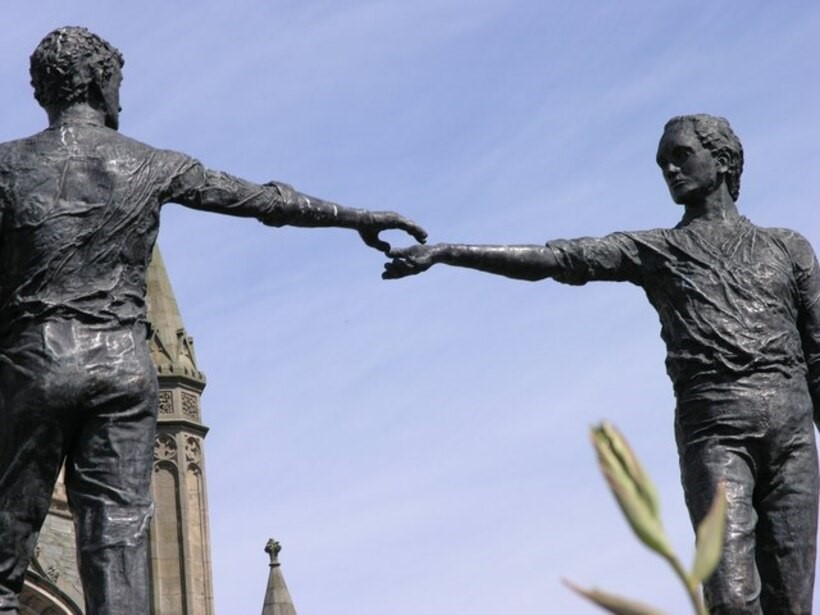The recent passing of Johan Galtung* leaves the field of Peace Studies without one of its founding giants. His work was about understanding violence and building positive peace; a society in which all people can flourish. This is in contrast to negative peace, which is simply the absence of direct violence. More than that, Galtung provided me with a framework through which to make sense of the world of South Africa, where I was born – a deeply racist one propped up by seemingly good people.
Galtung distinguished between direct violence (e.g. people are murdered), structural violence (indirect violence which may harm or even kill people such as institutionalized classism, racism, sexism, poverty etc.), and cultural violence (those aspects of culture, such as religion, ideology, and language, that can be used to justify direct or structural violence). To build a positive and peaceful society we need to address all three of these aspects of violence. To illustrate this, let’s look at how Apartheid South Africa was justified:
That a policy of apartheid should be adopted in the mutual interests of the white and non-white population of South Africa; …that it was the Christian duty of whites to act as guardians over the non-white races until such a time as they reached the level necessary to decide their own concerns …; that in the interests of all races no further blood-mixture should take place;… that the calling and duty of the white race in South Africa was to ensure that full control over all aspects of government in white areas should be retained in white hands [Dubow, 1987: 256-257].**
From this extract you can see how the mixing of racism, superiority and biblical texts (cultural violence) converged to support the policy of Apartheid (structural violence) by seemingly good people seeking to live out their Christian virtues. The theological injunctions spoke to the superiority and chosen-ness of the ‘white man’ and drew on Biblical narratives in which South Africa was seen as the ”promised land”. The (il)logic goes something like this: if I as a white person am chosen by God, then you as a black person cannot be chosen as you’re not in ‘our’ group. This gives me permission to subjugate whom I please.
But significantly, and dangerously, because these narratives are so deeply entrenched, they become normalised and believed to be part of what it means to be a good Christian. So, not only did these worldviews justify an unequal and deeply divided racist society, they also gave legitimacy to direct violence such as racist behaviours and killing people based on their racial identity.
For Apartheid to end, it had to be disconnected from its powerhouse (i.e. the underlying worldviews). This took place through solidarity movements, theological debate, economic sanctions, human rights defenders and grassroots activism.
We might be tempted to think that these beliefs were limited to South Africa, but this is not the case. We can see how cultural violence underpinned society in Northern Ireland. This was particularly visible in way in which religion and politics have been conflated and Scripture is used to justify sectarianism and violence. For example, both the Easter Proclamation and the Ulster Covenant, which are foundational documents in the history of the Troubles, invoke God’s blessing in defending their cause. It is also well illustrated in the slogan ‘For God and for Ulster’. Moreover, the conflation of religion and politics is also visible in the use of the binary identity markers PUL (Protestant, Unionist, and Loyalist) and CNR (Catholic, Nationalist and Republican). It assumes that all Protestants hold a Unionist and/or Loyalist politics, and all Catholics a Nationalist and/or Republican politics. This is not the case. It also leaves no room for those who do not identify as Catholic nor Protestant to be part of the narrative. However, what these narratives do, perhaps unwittingly, is reinforce a society deeply divided along sectarian lines.
Although both South Africa and Northern Ireland have gone through a peace process we still live in the shadows of negative peace. While this might give the illusion of peace, it risks normalising those worldviews that power injustice.
However, what we can learn from liberation theologians is that that we cannot appeal to the Pharaohs of the World (those who hold the power), to build a positive, peaceful and flourishing society. Such change must come from the people; faith leaders need to help lead the way in this. This requires uncovering the theologies that empower division and sectarianism, and offering alternative theologies that lead to activities that church, along with others, can engage in to transform sectarianism and other forms of structural violence. To do this, church leaders must acknowledge the complicity of the church in the history of the Troubles and pain and loss that accompanies this.
Dr Cathy Bollaert is the Research and Learning Lead at Christian Aid and has worked towards the goal of reconciliation in numerous post-conflict societies including South Africa, Sri Lanka and Northern Ireland/the North of Ireland.
Please note that the statements and views expressed in this article of those of the author and do not necessarily represent those of Contemporary Christianity.
* Johan Galtung (24 October 1930 – 17 February 2024) was a Norwegian sociologist and the principal founder of the discipline of peace and conflict studies.
** DUBOW, S., 1987. Race, Civilisation and culture: The elaboration of segregationist discourse in the inter-war Years. In: S. MARKS and S. TRAPIDO, eds, The politics of race, class and nationalism in twentieth century South Africa. Essex: Longman Group, pp. 71-94.


Thank you, Cathy, for this important reflection. Key framework for analysis.